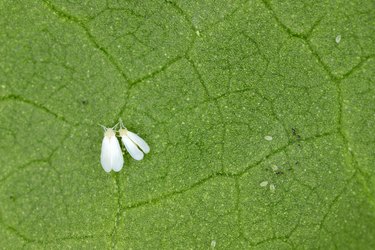
Some homeowners may incorrectly believe that protection from insect pests is important only when growing ornamental or garden plants, but lawn grasses and indeed any other type of plant can suffer damage from insect pests. Whiteflies, for instance, are common insect pests of lawn grasses. You need to effectively control whiteflies in order to protect the health of your grass.
Whiteflies
Video of the Day
Whiteflies earn their name because their entire bodies are white and somewhat translucent. Their body shape is similar to that of a moth, so they are sometimes confused with moths, but whiteflies are actually more closely related to aphids, mealybugs and scale. Whiteflies are considered a damaging pest on nearly any kind of plant.
Video of the Day
Damage Caused
Whiteflies are much less likely to attack grasses than vegetable crops, greenhouse plants or ornamental plants; so if you observe whiteflies on your lawn, the chances are good that they have traveled from another nearby plant to your lawn grass. Inspect the plants near your lawn grass to see if the leaves of the plants are wilted, droopy or defoliated altogether. Whitefly-infested foliage will be covered in a sweet excrement called honeydew that whiteflies secrete wherever they travel.
Natural Control Methods
Many insect species that naturally occur in your garden, such as spiders, lady beetles and lacewings, can prevent whitefly infestations by preying on the flies and keeping populations under control, so one of the most important natural control methods for whiteflies is to avoid the use of insecticides that could reduce the populations of these natural whitefly predators. Pruning off and destroying foliage that has already suffered extensive damage also can prevent the whiteflies from moving to other parts of the plant or to other nearby plants.
Chemical Controls
In some rare cases of peculiarly severe whitefly infestation, an insecticide treatment may be necessary. Experts generally recommend horticultural oils or insecticidal soaps such as neem oil or narrow-range oil over contact insecticides since whiteflies are notoriously difficult to control using traditional contact insecticides.